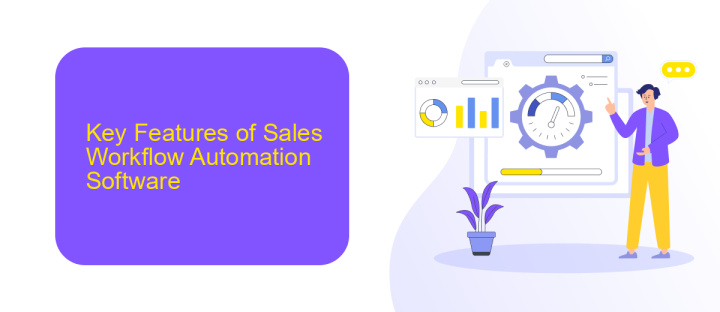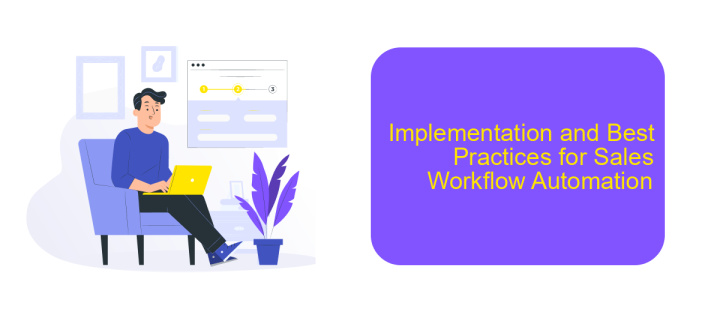Sales Workflow Automation
Sales workflow automation is revolutionizing the way businesses manage their sales processes. By leveraging advanced software tools, companies can streamline repetitive tasks, enhance productivity, and improve customer interactions. This article explores the key benefits of sales workflow automation, how it can transform your sales operations, and the essential features to look for when choosing the right automation solution for your business.
Benefits of Sales Workflow Automation
Sales workflow automation offers numerous advantages for businesses looking to streamline their sales processes. By automating repetitive tasks, sales teams can focus more on building relationships and closing deals, ultimately increasing productivity and revenue.
- Enhanced efficiency: Automation reduces manual data entry and administrative tasks.
- Consistency: Standardized processes ensure a uniform approach to sales activities.
- Improved accuracy: Automation minimizes human errors in data handling.
- Time savings: Sales representatives can allocate more time to high-value activities.
- Better insights: Automated systems provide real-time analytics and reporting.
Integrating various tools and platforms is essential for seamless sales workflow automation. Services like ApiX-Drive facilitate easy integration between CRM systems, email marketing tools, and other applications, ensuring that data flows smoothly across all platforms. This not only enhances operational efficiency but also provides a holistic view of customer interactions, enabling better decision-making and strategy development.
Key Features of Sales Workflow Automation Software

Sales workflow automation software streamlines and optimizes the sales process by automating repetitive tasks, allowing sales teams to focus on closing deals. Key features include lead management, which automatically captures, tracks, and nurtures leads through the sales funnel. Additionally, contact management centralizes customer information, ensuring that sales representatives have access to up-to-date data. Automated follow-ups and reminders help maintain consistent communication with prospects, enhancing customer engagement and improving conversion rates.
Another essential feature is integration capabilities with various CRM systems, email marketing platforms, and other sales tools. For instance, ApiX-Drive facilitates seamless integration, enabling data synchronization across multiple applications without manual intervention. This integration ensures that all sales-related data is accurate and readily available. Reporting and analytics tools provide insights into sales performance, helping managers make informed decisions. Furthermore, customizable workflows and templates allow teams to tailor the automation process to their specific needs, maximizing efficiency and productivity.
How to Choose the Right Sales Workflow Automation Software

Choosing the right sales workflow automation software can significantly enhance your sales process, streamline operations, and boost productivity. Begin by assessing your specific needs and objectives, such as lead management, follow-up automation, or reporting capabilities.
- Identify Key Features: Look for software that offers essential features like lead tracking, email automation, and reporting tools.
- Consider User Experience: Ensure the software is user-friendly and offers a seamless experience for your sales team.
- Check Integration Capabilities: Verify if the software can integrate with your existing CRM and other tools. Services like ApiX-Drive can facilitate these integrations effectively.
- Evaluate Scalability: Choose a solution that can grow with your business and accommodate increasing sales volumes.
- Review Customer Support: Opt for software that provides robust customer support and training resources.
Finally, take advantage of free trials or demos to test the software in real-world scenarios. This hands-on experience will help you make an informed decision and ensure the chosen solution aligns with your sales goals and workflows.
Implementation and Best Practices for Sales Workflow Automation

Implementing sales workflow automation requires a strategic approach to ensure seamless integration and maximum efficiency. Begin by identifying repetitive tasks that can be automated, such as lead management, follow-ups, and data entry. Establish clear objectives and key performance indicators (KPIs) to measure the success of your automation efforts.
Next, choose the right tools and platforms that align with your business needs. Platforms like ApiX-Drive can help facilitate integrations with various CRM systems, marketing automation tools, and other sales-related applications. This ensures that data flows smoothly between systems, eliminating manual data entry and reducing the risk of errors.
- Identify and automate repetitive tasks
- Set clear objectives and KPIs
- Choose the right tools and platforms
- Ensure seamless data integration
- Regularly review and optimize workflows
Regularly review and optimize your automated workflows to adapt to changing business needs. Monitor performance against your KPIs and make adjustments as necessary. By following these best practices, you can enhance your sales processes, improve efficiency, and drive better results.
Challenges and Future of Sales Workflow Automation
Sales workflow automation faces several challenges, including integration complexities, data accuracy, and user adoption. Integrating various tools and platforms can be cumbersome, often requiring technical expertise. Ensuring data accuracy is another significant hurdle, as inaccurate data can lead to misguided sales strategies. Additionally, getting team members to adopt new automated processes can be difficult, as it often involves a change in established workflows and habits.
The future of sales workflow automation looks promising with advancements in AI and machine learning. These technologies can enhance predictive analytics, personalize customer interactions, and streamline processes. Tools like ApiX-Drive are making it easier to integrate various sales platforms without extensive technical knowledge, thereby reducing integration barriers. As automation technologies evolve, we can expect more intuitive and user-friendly solutions that will drive higher adoption rates and improve overall sales efficiency.
- Automate the work of an online store or landing
- Empower through integration
- Don't spend money on programmers and integrators
- Save time by automating routine tasks
FAQ
What is Sales Workflow Automation?
How can Sales Workflow Automation benefit my business?
What types of tasks can be automated in a sales workflow?
How do I integrate Sales Workflow Automation into my existing CRM?
Is Sales Workflow Automation suitable for small businesses?
Apix-Drive is a universal tool that will quickly streamline any workflow, freeing you from routine and possible financial losses. Try ApiX-Drive in action and see how useful it is for you personally. In the meantime, when you are setting up connections between systems, think about where you are investing your free time, because now you will have much more of it.


